Liyuan Garden: A Hidden Gem for Nature Lovers and Architecture Enthusiasts
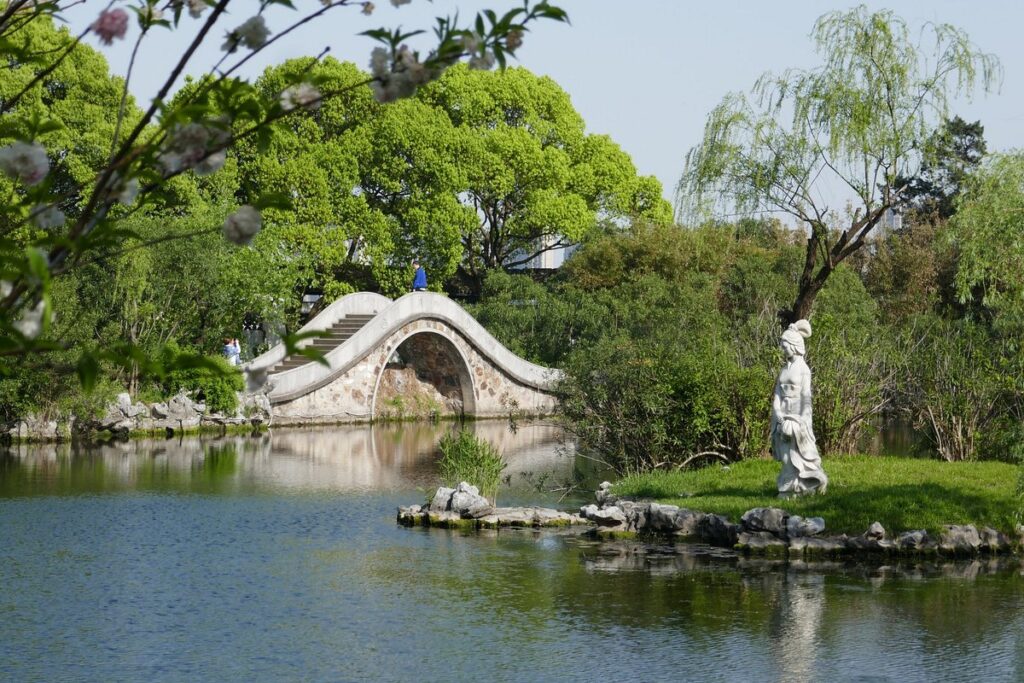
An Essential Guide to Visiting Liyuan Garden
Nestled along the scenic banks of Lihu Lake in Wuxi, Liyuan Garden (蠡园) beckons visitors with its enchanting blend of natural beauty and traditional Chinese architecture. What sets this classical garden apart is its unique layout, surrounded on three sides by shimmering waters, creating a serene escape that feels worlds away from the bustling city. With charming artificial bridges, delicately crafted pagodas, and tranquil fishponds, each corner of Liyuan Garden offers a picturesque view worthy of a canvas.
In this essential guide, you will discover everything you need to know to make the most of your visit to Liyuan Garden. We’ll explore the best times to visit, essential tips for navigating the garden’s winding paths, and not-to-miss features that will enrich your experience. Whether you’re a nature enthusiast, a photography aficionado, or a traveler seeking a moment of tranquility, Liyuan Garden promises a captivating journey into the heart of Chinese horticultural artistry. So, prepare to immerse yourself in the beauty of this exquisite garden and take in the stunning sights that await!
In This Guide
- An Essential Guide to Visiting Liyuan Garden
- The Rich History and Legends of Liyuan Garden
- Main Highlights: What You Absolutely Can’t Miss
- Planning Your Visit: A Practical Guide
- Tickets: Prices, Booking, and Tips
- How to Get There: A Complete Transportation Guide
- Local Cuisine and Accommodation Nearby
- Frequently Asked Questions
- Final Thoughts on Your Trip
The Rich History and Legends of Liyuan Garden
Liyuan Garden, located in Wuxi, China, is not just a serene escape surrounded by the picturesque Lihu Lake; it is also a treasure trove of history and legends that reflect the rich tapestry of Chinese culture. This classical garden, known for its exquisite design and tranquil atmosphere, has been a witness to many historical events and local myths that continue to enchant visitors today.
The Origins of Liyuan Garden
Dating back to the early Qing Dynasty (1644-1912), Liyuan Garden was originally established as a private retreat for a wealthy scholar and his family. The garden was designed to embody the principles of traditional Chinese landscape architecture, incorporating natural elements such as water, rock formations, and plants to create harmonious scenery. Over the years, it underwent several renovations, expanding its beauty and significance, eventually becoming a public garden in the late 20th century.
A Symbol of Cultural Revival
During the late 19th century, as China faced foreign pressures and internal strife, Liyuan Garden became a symbol of cultural revival. Scholars and artists would gather here to discuss poetry, philosophy, and art, drawing inspiration from the tranquil surroundings. The garden’s design features intricate pavilions, winding paths, and elegant bridges, which serve as a backdrop for these creative endeavors. This period solidified Liyuan’s reputation as a cultural hub, fostering an appreciation for traditional Chinese aesthetics.
Legends of Liyuan
Among the many legends associated with Liyuan Garden, one of the most famous tells the story of a beautiful fairy who descended from the heavens to visit the garden. Local folklore suggests that every spring, when the cherry blossoms bloom, the spirit of the fairy can be seen dancing among the flowers. This enchanting tale has made the garden a popular spot for couples and families looking to capture the essence of romance and beauty during the cherry blossom season.
Another captivating legend is that of the “Fisherman’s Wish.” It is said that if a fisherman casts his net into the pond of the garden and catches a fish, he will be granted a wish. This legend attracts many visitors, who come hoping to experience a bit of magic in their own lives. The interplay of water and land within the garden serves as a reminder of the balance between nature and ambition, a theme deeply rooted in Chinese philosophy.
Preservation and the Modern Era
In recent years, efforts have been made to preserve Liyuan Garden’s historical essence while accommodating the influx of tourists. The garden has been recognized for its beauty and historical importance, receiving accolades as one of the top attractions in Wuxi. Today, visitors can wander along its meandering pathways, admire the traditional architecture, and engage with the rich stories that have shaped this serene locale.
Conclusion
Liyuan Garden stands as a testament to the beauty of nature and the depth of Chinese culture. Its rich history, intertwined with captivating legends, offers an enriching experience for all who visit. Whether you are seeking a peaceful retreat or a glimpse into the past, Liyuan Garden invites you to explore its enchanting landscapes and the stories that echo through time.
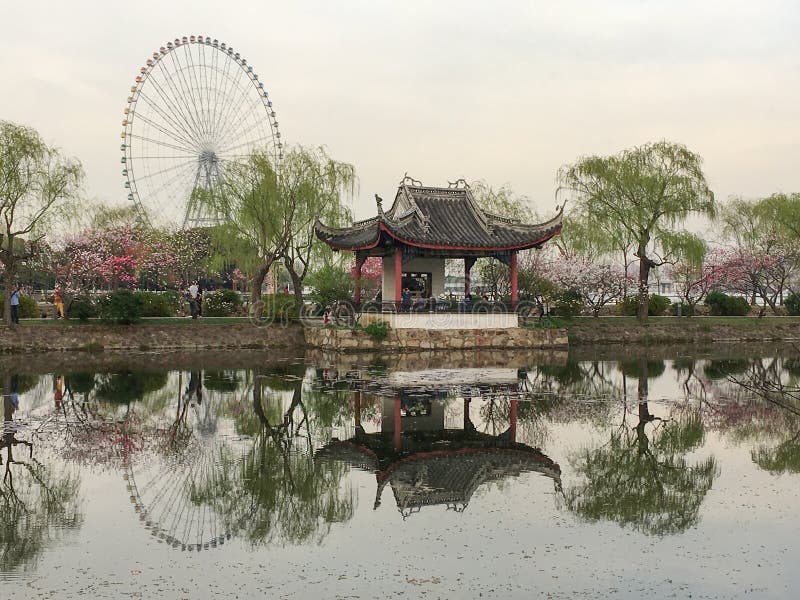
Liyuan Garden.
Main Highlights: What You Absolutely Can’t Miss
Serene Fishponds and Bridges
As you enter Liyuan Garden, the first feature that will capture your attention is the network of peaceful fishponds, adorned with koi gliding gracefully beneath the surface. These tranquil waters are interconnected by charming artificial bridges, perfect for a leisurely stroll. Lean over the railings to watch the fish dart below or simply take a moment to relish the garden’s serene atmosphere. Tip: Arrive early in the morning for a quieter experience and to capture the stunning reflections of the bridges and trees on the water.
Majestic Pagodas
Scattered throughout the garden, the elegant pagodas serve as both architectural marvels and vantage points for stunning views of Lihu Lake. Each pagoda is intricately designed, showcasing traditional Chinese architectural styles that transport you back in time. Climbing to the upper levels, you’ll be rewarded with panoramic views that make for excellent photographs. Tip: Don’t miss the golden hour—sunset offers a magical backdrop for your photos, illuminating the pagodas and surrounding nature.
The Liyuan Pavilion
This is the heart of the garden, a delightful structure that serves as a perfect spot for relaxation and contemplation. With its open-air design, the Liyuan Pavilion invites guests to sit and enjoy the surrounding beauty. The gentle breeze and chirping birds create a serene ambiance that encourages introspection. Tip: Bring a book or a sketchpad, and take advantage of the peaceful setting to unwind and connect with nature.
Bamboo Groves
Immerse yourself in the soothing rustle of the bamboo groves that line several paths within the garden. The tall, slender stalks sway gently with the wind, creating a tranquil atmosphere that’s ideal for a leisurely walk. As you wander through, listen closely to the soft whispers of the bamboo—it’s a reminder of nature’s calming power. Tip: These groves also provide excellent shade on sunny days, making them a great spot to escape the heat.
Scenic Viewpoints
Throughout Liyuan Garden, strategically placed viewpoints provide sweeping vistas of Lihu Lake and the surrounding landscape. These spots are perfect for capturing breathtaking photographs. The juxtaposition of the lush greenery against the tranquil lake creates a picturesque scene that’s hard to forget. Tip: Pack a picnic and choose one of these viewpoints to enjoy a meal while soaking in the views.
The Cultural Garden Area
This section of Liyuan Garden showcases traditional Chinese culture through various installations, including calligraphy stones and historical sculptures. Here, you can learn about the local heritage and artistic expressions that have shaped the region. It’s a perfect blend of nature and culture, making it a must-visit area. Tip: Participate in any cultural activities or workshops that may be offered during your visit, as these experiences provide deeper insight into the local traditions.
Cozy Tea House
After exploring the garden, take a break at the cozy tea house nestled within its grounds. Here, you can savor authentic Chinese teas while enjoying views of the lush landscape. The tea house is designed to enhance your experience, with comfortable seating and a peaceful ambiance that invites you to linger. Tip: Try the local specialty teas, and if available, join a tea tasting session to learn more about the different varieties offered.
Liyuan Garden is a serene oasis that perfectly blends natural beauty with cultural richness. By exploring these highlights, you’ll create lasting memories of your visit.
Liyuan Garden.
Planning Your Visit: A Practical Guide
Best Time to Visit
Liyuan Garden is a delightful destination year-round, but the best time to visit is during the spring (April to June) and autumn (September to November). During these seasons, the weather is mild, making it perfect for leisurely strolls among the blooming flowers and lush greenery. The cherry blossoms in spring and the vibrant autumn foliage offer stunning backdrops for your photos. If you prefer fewer crowds, consider visiting on weekdays.
Recommended Itinerary
For a fulfilling day at Liyuan Garden, follow this suggested itinerary:
Morning:
– 8:00 AM: Arrive early to enjoy the tranquility of the garden before the crowds arrive.
– 8:15 AM: Start your visit at the entrance and take a leisurely stroll along the winding paths, admiring the various bridges and pagodas.
Midday:
– 11:00 AM: Find a scenic spot to relax and enjoy a packed lunch or snack. Some benches are available, or you can bring a picnic blanket.
– 12:00 PM: Continue your exploration, visiting the small fishponds and taking in the serene atmosphere.
Afternoon:
– 2:00 PM: Head to the nearby Lihu Lake for a scenic boat ride if available, adding another layer of beauty to your visit.
– 3:30 PM: Wrap up your visit by exploring the local area for nearby attractions or cafes.
Photography Tips
- Golden Hour: For the best natural lighting, visit during the early morning or late afternoon. The soft light enhances the beauty of the gardens and the reflections on the water.
- Focus on Details: Capture the intricate designs of the bridges and pagodas, as well as the vibrant flora and fauna. A close-up lens can help highlight these details.
- Wide Shots: Use a wide-angle lens to capture the expansive views of the garden and Lihu Lake, especially during sunrise and sunset when the colors are most vibrant.
What to Wear
Dress comfortably for your visit, keeping in mind the following tips:
- Footwear: Wear sturdy walking shoes or sandals, as the garden features various pathways and bridges that are best explored on foot.
- Layers: The weather can change, particularly during the spring and fall. Bring a light jacket or sweater and dress in layers to stay comfortable throughout the day.
- Sun Protection: Don’t forget your sunglasses and a hat, especially during the summer months, as you’ll want to shield yourself from the sun while enjoying the outdoors.
Insider Tips
-
Explore Beyond the Garden: Take time to visit nearby attractions such as the Taihu Yuantouzhu Scenic Spot. It offers beautiful views of the lake and additional walking trails.
-
Local Cuisine: After your garden visit, indulge in local Wuxi cuisine at nearby restaurants. Don’t miss trying the famous Wuxi spareribs!
-
Guided Tours: Consider joining a guided tour to gain deeper insights into the garden’s history and cultural significance. Many local guides offer engaging narratives about the area.
-
Birdwatching: Bring binoculars if you’re a bird lover. The garden is home to various bird species that can be spotted throughout the area.
-
Stay Hydrated: Bring a water bottle to stay hydrated, as exploring the garden can be quite an active endeavor, especially during warmer months.
With this practical guide in hand, you’re all set for an unforgettable visit to Liyuan Garden, where nature and culture beautifully intertwine. Enjoy your exploration!
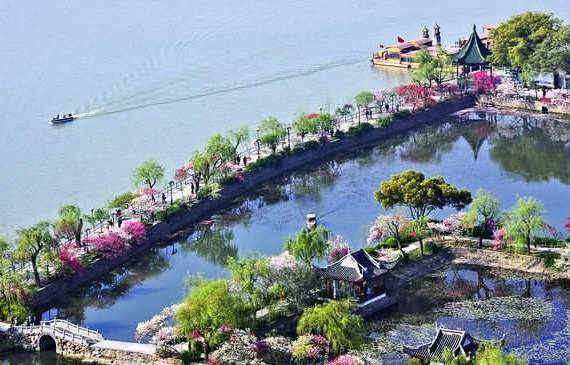
Liyuan Garden.
Tickets: Prices, Booking, and Tips
When planning your visit to Liyuan Garden, it’s essential to be informed about ticket prices, what’s included, and how to secure your entry. Here’s a comprehensive guide to help you navigate your booking process smoothly.
Ticket Information
| Ticket Type | Price (CNY) | Includes |
|---|---|---|
| Adult Ticket | 60 | Entry to Liyuan Garden |
| Child Ticket | 30 | Entry for children aged 6-18 |
| Senior Ticket | 30 | Entry for seniors (60+) |
| Family Package | 150 | 2 Adults + 2 Children |
Booking Your Visit
Booking your tickets in advance is highly recommended to ensure a seamless experience, especially during peak tourist seasons. Here are a few options for booking:
-
Official Website: Purchase tickets directly from the Liyuan Garden official website. This option often provides the most up-to-date information and pricing.
-
Travel Apps: Utilize popular travel apps like Trip.com or Klook, which cater to international travelers and may offer exclusive discounts.
-
Tour Packages: Consider booking a guided tour that includes Liyuan Garden in its itinerary. This often provides additional insights into the garden’s history and significance.
Tips for Your Visit
-
Plan Ahead: Liyuan Garden is a popular attraction and can get crowded, especially on weekends and holidays. Aim to visit during weekdays if possible.
-
Arrival Time: The garden opens at 8:00 AM. Arriving early not only allows you to enjoy a quieter experience but also gives you ample time to explore the beautiful surroundings.
-
Bring Essentials: Don’t forget to bring your identification for ticket verification, especially for senior discounts.
By following these guidelines, you can make the most of your visit to Liyuan Garden and immerse yourself in the tranquil beauty of this classical Chinese landscape. Enjoy your journey!
How to Get There: A Complete Transportation Guide
Traveling to Liyuan Garden: A Comprehensive Transportation Guide
Liyuan Garden, a stunning classical Chinese garden nestled on the banks of Lihu Lake in Wuxi, China, is a must-visit for any traveler seeking tranquility and natural beauty. To help you reach this enchanting destination, here’s a detailed transportation guide.
From the Nearest Major City: Shanghai
By Train:
The fastest and most convenient way to get to Wuxi from Shanghai is by high-speed train. Trains depart frequently from Shanghai Hongqiao Railway Station to Wuxi Railway Station, with a journey time of around 1 to 1.5 hours. Tickets typically range from CNY 70 to CNY 120 (approximately USD 10 to USD 18), depending on the train class and availability.
By Bus:
If you prefer traveling by bus, buses from Shanghai to Wuxi leave from various locations, including Shanghai South Bus Station. The bus journey takes about 2 to 3 hours, and tickets usually cost around CNY 30 to CNY 50 (about USD 5 to USD 8). Keep in mind that travel times can vary due to traffic conditions.
By Car:
For those who prefer driving, you can rent a car or hire a taxi for the journey. The distance from Shanghai to Wuxi is approximately 150 kilometers (93 miles), and the drive typically takes around 2 hours, depending on traffic. Expect to pay tolls along the way, which can add up to around CNY 50 to CNY 100 (USD 7 to USD 15).
From the Nearest Airport: Sunan Shuofang International Airport (WUX)
By Taxi:
Sunan Shuofang International Airport is about 20 kilometers (12 miles) from Liyuan Garden. A taxi ride will take around 30 minutes and costs approximately CNY 50 to CNY 80 (around USD 7 to USD 12).
By Shuttle Bus:
There are also shuttle buses available from the airport to Wuxi city center, with stops at various locations. This option is more economical, costing about CNY 20 (USD 3), but may take longer due to multiple stops.
Getting Around the Scenic Area
Once you arrive at Liyuan Garden, exploring the area is easy and enjoyable.
On Foot:
The garden is best experienced on foot, allowing you to stroll leisurely and soak in the beauty of the artificial bridges, pagodas, and tranquil fishponds. The paths are well-marked and easy to navigate.
Bicycles:
If you’re feeling adventurous, consider renting a bicycle. Nearby rental shops offer bikes for around CNY 20 to CNY 50 (USD 3 to USD 8) per hour. Cycling around Liyuan Garden and along Lihu Lake can add another layer of enjoyment to your visit.
Local Transportation:
For those looking to venture beyond the garden, Wuxi’s public transportation system is efficient. Buses and taxis are readily available, and ride-hailing apps like Didi can be used for convenience.
Tips for Your Journey
- Plan Ahead: Check train and bus schedules in advance, especially during weekends or holidays when they may be busier.
- Cash and Apps: While many places accept digital payments, it’s wise to have some cash on hand for small purchases or transportation.
- Language Barrier: Some signage might not be in English, so having a translation app can be helpful.
With this transportation guide in hand, you’re all set to immerse yourself in the serene beauty of Liyuan Garden. Enjoy your journey!
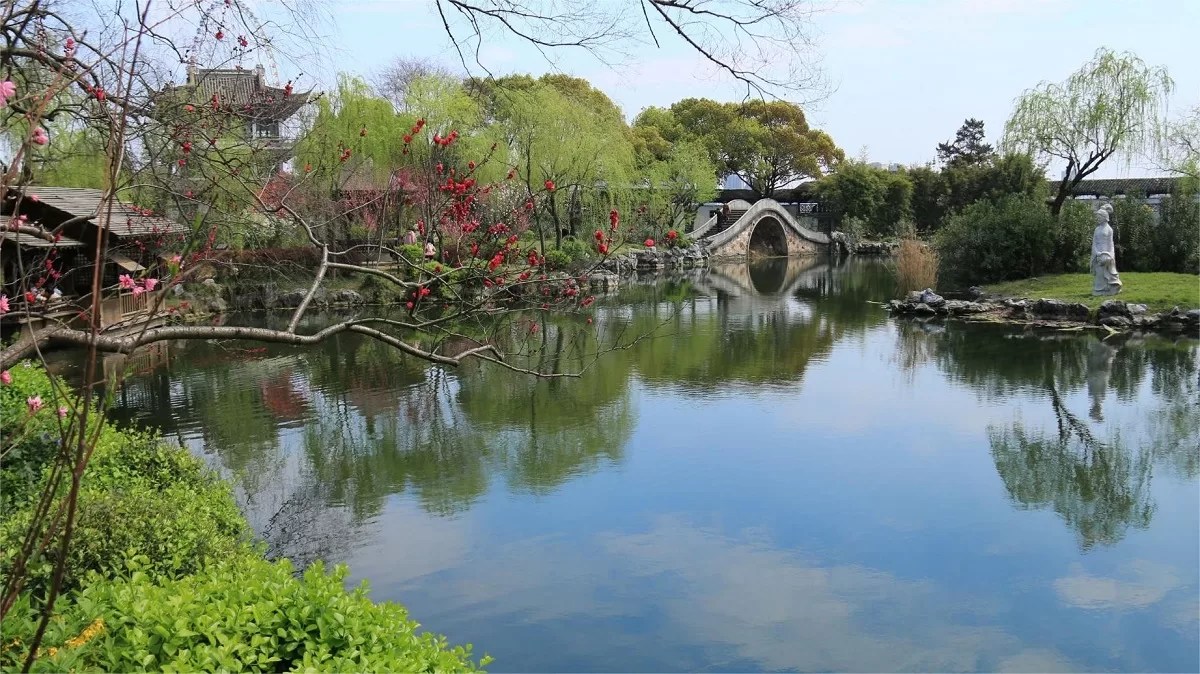
Liyuan Garden.
Local Cuisine and Accommodation Nearby
When visiting Liyuan Garden in Wuxi, immersing yourself in the local cuisine and finding the perfect place to stay can greatly enhance your experience. Here’s a curated selection of delightful dishes and nearby accommodations to suit every traveler’s preference.
Savor the Local Flavors
-
Wuxi Spare Ribs (无锡排骨)
A signature dish of the region, Wuxi spare ribs are known for their tender, sweet, and savory flavor. The ribs are typically braised with soy sauce, sugar, and a mix of spices, resulting in a mouthwatering glaze that pairs perfectly with steamed rice. -
Taihu Fish (太湖鱼)
Freshwater fish from Taihu Lake are a local delicacy. Often steamed or braised, they are served with a light soy sauce and garnished with green onions and ginger. The freshness of the fish, combined with simple seasoning, highlights the natural flavors of the lake. -
Liyuan Noodles (蠡园面)
Named after the garden itself, Liyuan noodles are a must-try. These hand-pulled noodles are served in a robust broth, often accompanied by seasonal vegetables and a sprinkle of chili oil for added spice. It’s a comforting dish that’s particularly popular among locals. -
Eight Treasures Rice (八宝饭)
This traditional dessert is a sweet sticky rice dish filled with a medley of fruits, nuts, and sometimes red bean paste. Its vibrant colors and rich flavors make it a festive choice, often enjoyed during celebrations.
Where to Stay
Luxury Option: Wuxi Marriott Hotel Lihu Lake
Located just a short distance from Liyuan Garden, this upscale hotel offers stunning views of Lihu Lake. Guests can indulge in elegant rooms, a luxurious spa, and various dining options, including authentic Chinese cuisine. The hotel’s proximity to the garden makes it an ideal choice for those who want to explore the area.
Boutique Choice: TaiHu HuaYuan Hotel
For a more intimate experience, TaiHu HuaYuan Hotel provides charming accommodations with a unique local flair. With comfortable rooms and a cozy atmosphere, it’s a great base for exploring Wuxi’s attractions. The hotel often features local art and decor, enhancing your cultural experience.
Budget-Friendly: Yijia Hotel
If you’re traveling on a budget, Yijia Hotel offers clean and simple lodging close to Liyuan Garden. It’s a no-frills option that provides all the essentials for a comfortable stay without breaking the bank. The location is convenient for accessing local eateries and attractions.
Conclusion
With its rich culinary offerings and a range of accommodations, your visit to Liyuan Garden can be a delightful and memorable experience. Whether you’re indulging in local dishes or unwinding in a cozy hotel, Wuxi is sure to leave a lasting impression. Enjoy your journey!
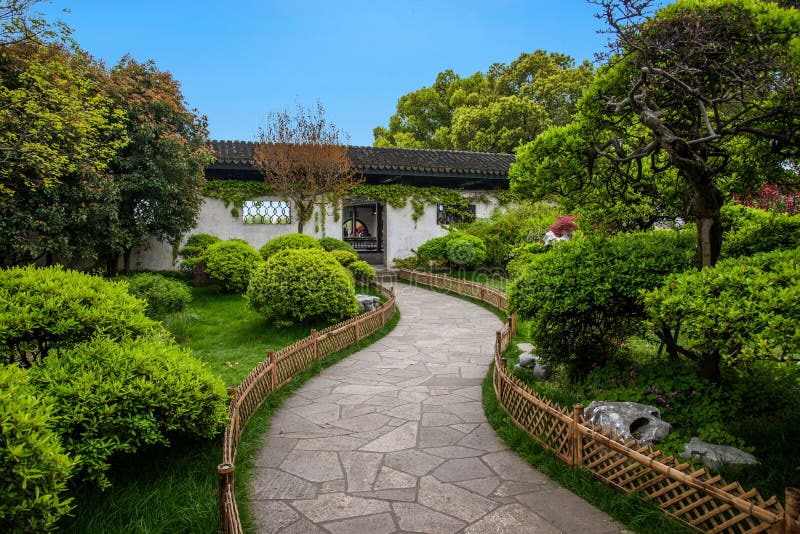
Liyuan Garden.
Frequently Asked Questions
Frequently Asked Questions about Liyuan Garden
-
Is Liyuan Garden suitable for children and elderly visitors?
Yes, Liyuan Garden is a family-friendly destination. The garden features well-maintained pathways, scenic spots, and plenty of space for children to explore. Elderly visitors will also find it accessible, with seating areas available throughout the garden for resting. -
How much time should I plan to spend at Liyuan Garden?
It is recommended to allocate around 1.5 to 2 hours to fully enjoy the beauty of Liyuan Garden. This allows ample time to stroll through the various sections, take photos, and appreciate the tranquil scenery. -
Are there English signs and information available in the garden?
Yes, Liyuan Garden provides English signage and informational displays throughout the grounds. This makes it easier for international visitors to navigate and learn about the history and features of the garden. -
What are the opening hours of Liyuan Garden?
Liyuan Garden is open daily from 8:00 AM to 6:00 PM. Be sure to arrive early to take advantage of cooler morning temperatures and fewer crowds. -
Is there an admission fee to enter Liyuan Garden?
Yes, there is an entrance fee to visit Liyuan Garden. The fee is relatively modest, making it an affordable option for enjoying one of Wuxi’s most beautiful attractions. -
Are there dining options available within or near Liyuan Garden?
While there are no dining facilities directly within the garden, several restaurants are located nearby. Options range from local Chinese cuisine to international fare, ensuring you can find something delicious to enjoy after your visit. -
Is photography allowed in the garden?
Absolutely! Photography is encouraged in Liyuan Garden, as it offers stunning landscapes, traditional architecture, and picturesque ponds. Just be respectful of other visitors while capturing your memories. -
How do I get to Liyuan Garden from Wuxi city center?
Liyuan Garden is easily accessible from Wuxi city center by public transport, taxi, or private vehicle. If using public transport, check local bus routes, or consider taking a taxi for a more direct and convenient option.
Final Thoughts on Your Trip
As your journey through Liyuan Garden comes to a close, take a moment to soak in the serene beauty that surrounds you. This classical Chinese garden, cradled by the tranquil waters of Lihu Lake, offers a delightful blend of natural and architectural wonders. Stroll across charming bridges, admire the intricately designed pagodas, and listen to the gentle rustling of leaves as you wander through pathways adorned with vibrant flora and serene fishponds.
Whether you’re capturing the perfect photograph or simply enjoying a quiet moment of reflection, Liyuan Garden invites you to immerse yourself in its peaceful ambiance. As you leave, remember that this sanctuary of beauty is not just a place to visit, but an experience to cherish. Carry the tranquility and inspiration of Liyuan with you, and let it remind you of the simple joys of nature and the rich cultural heritage of China. Until your next adventure, may your travels continue to be filled with wonder and discovery!